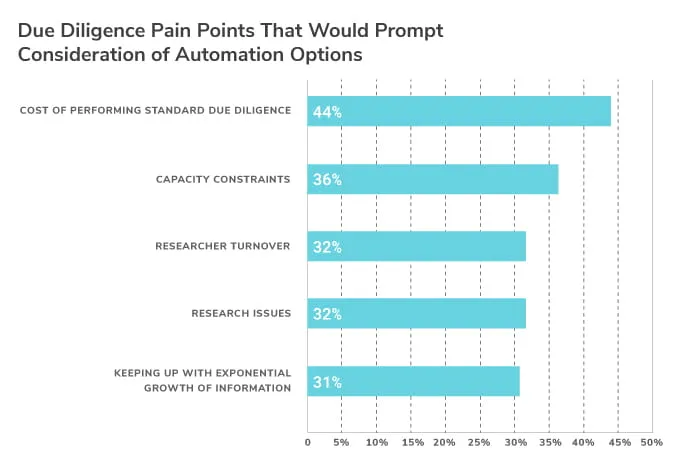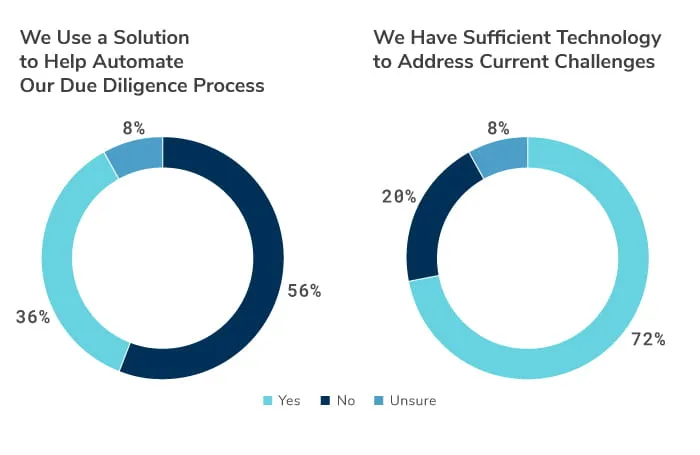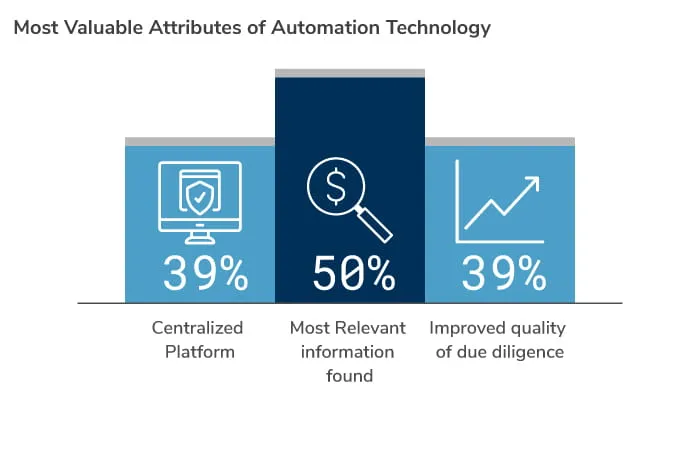Our 2021 Anti-Bribery and Corruption (ABC) Survey asked several questions around the impact of technology, specifically automation and AI, on ABC programs. Market forces are constantly evolving, requiring businesses to stay agile. These forces can include regulatory, competitive or geopolitical considerations, just to name a few. The one constant is the rise of technology–specifically automation–and its ability to aid businesses, whether that means easing the burden of critical processes, keeping costs in check or supporting rapid growth.
Can Automation Reduce the Pain Points of Due Diligence?
Our ABC survey found some interesting insights into organizations’ assessments of their challenges around due diligence. It is surprising to see that there are several competing pain points, all weighted relatively equally.

Our survey found that cost is the leading pain point related to carrying out standard due diligence. One can understand that there are significant costs associated with building out and sustaining a team of qualified compliance professionals to conduct high-quality risk research.
What is interesting is that the next three major pain points–capacity, turnover and research issues–are directly related to the management of the personnel. Across all industries, due diligence work can be highly labor intensive and detailed work; this results in a great deal of time sensitivity associated with it. It is no wonder that many companies struggle to ensure that they have teams with the bandwidth to keep up with the work. These struggles can lead to increased turnover due to researcher burnout and issues with the research output itself.
One final challenge that will be ever-present in today’s landscape is the issue of keeping up with the sheer amount of information that compliance and diligence professionals must work through in order to build a comprehensive and accurate risk picture.
When all primary challenges are considered, an organization can then begin to think about how best to solve them. As we will discuss next, automation may be a clear solution, though it may be the one that has been overlooked.
Exploring Organizations and their Relationship with Automation
Our recent ABC survey surfaced an interesting insight when we asked a similar question in two slightly different ways.

How can it be that most organizations feel they have sufficient technology for their programs, yet simultaneously, many also state that they do not use automation?
The answer may lie in how organizations define technology. Certainly, there are many applications and enterprise-level platforms in the market, all of which can be effective technology for assisting organizations. Automation, however, is a specific area of technology. It is a form of technology that can vastly improve the issues and pains described earlier. When employed correctly, automation can not only reduce overhead costs, but also support the scaling of operations, increase the speed and quality of a compliance team’s work, improve morale and help keep up with the exponential growth of information available.
In the due diligence world, automation tools have been successfully streamlining workflows and processes for some time now. What has been interesting to see is the rise of automation linked to specific technologies like AI and machine learning (ML) over the last few years.
Ultimately, technology can be a broad term. What our survey bears out, however, is that the specific challenges due diligence teams experience and the solutions and value they seek might be found in automation, making it worth deeper exploration.
The Value that Automation Delivers
Next, let’s look at the results from our ABC survey regarding value. Given below are the areas of value that organizations expect to derive from automation.

Some of these findings align with the challenges we discussed earlier, while others are not mentioned. For instance, we know cost, capacity and turnover are indeed challenges organizations struggle with. However, it turns out that companies value the quality of output the most. What this might be telling us is that cost, capacity and turnover are pain points that can be overcome when automation solves for the more important challenges: 1. finding relevant information more quickly and easily; and 2. having quality due diligence results. Not surprisingly, this is precisely what AI-powered automation is intended to deliver to due diligence professionals.
The need to have a centralized platform garnered a fair amount of attention by those surveyed. This makes a great deal of sense when you consider that due diligence operations within an organization can be comprised of a large set of individuals–often spanning multiple teams in multiple locations. Transparency and coordination are clearly top needs, particularly for large multinational corporations. Luckily, due diligence products that automate processes via AI or ML are sure to be cloud-based platforms that allow for a central view, where many users can access and coordinate their work.
Is Automation the Way Forward?
While the choice to move toward a more automated due diligence process is ultimately up to each organization, many organizations are currently looking to learn more about this form of technology. According to our survey, 60% of respondents are either using or plan to use this technology over the coming two to three years. This spans across multiple forms of AI, including ML, as well areas like natural language processing and robotic process.
While automation offers many benefits to strengthen ABC programs, it is up to each individual organization to decide if these technologies are the right fit for their organization.

